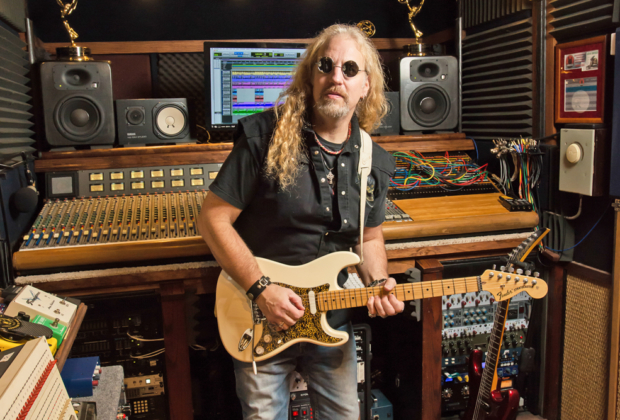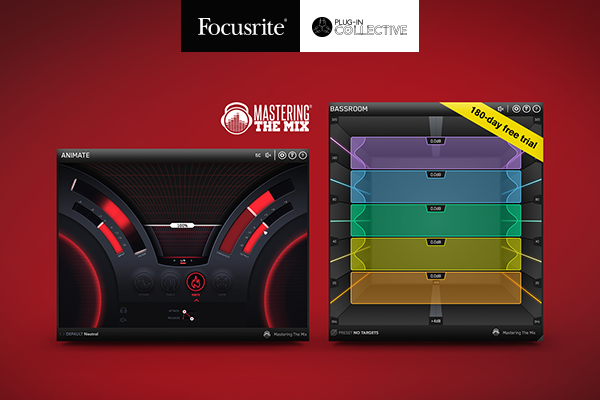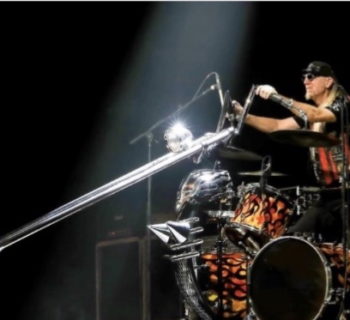Today we are spoiled with all of the technological advances we have at our fingertips when it comes to computer recording. I always viewed this as a double-edged sword. On the one hand it is very convenient to be able to use a program like Logic Pro and choose a prerecorded drum setting, but on the other hand this makes productions sound homogenized. I think everything of course has its place, but for commercial record production, I lean towards custom recorded instruments, meaning using real musicians! There are a lot of things to keep in mind when you are self-producing, engineering and performing on records today. In the days of old, there was a whole team of people at a record company that would ensure an artist’s success, such as A&R, art department, finance dept, recording studio, etc. But today artists have to wear all of these hats. Yes the artist keeps all of the royalties and masters now, however they also have to make the correct decisions during production. Hopefully the below will help you make better recordings and understand the process.
- Composing the Right Songs. The first step to making a strong album is composing the right music. I can’t tell you how many people out there just hang on the same handful of songs for 15 years and still want to rework them into a new album. The fact is I have always found it much more productive to start from scratch and just write new material until you have well over an album’s worth of songs. Then from there start to weed out the weaker material until you have 10 very strong songs!
- Casting Guest Artists for the Right Tracks. This step can be done simultaneously with writing the tracks for the album. I’ve produced, engineered and performed on a number of concept albums like Guitars for Wounded Warriors, Orlando in Heaven, and Guitars for Veterans in which I’ve always thought about the guest I want on a track while composing so I tailor the music to that particular artist’s sound. For example when I wrote the song “Black Hawk” I already knew that I wanted Billy Sheehan on the track so I tailored the music to his style giving him a nice space in the middle to shine on bass. I approach all of my albums this way. On Guitars for Wounded Warriors, I composed a nice ballad entitled “Freedom” with Steve Morse already in mind for the track. When he heard the song it inspired him to write a beautiful melody that we both harmonized on for the final mix.
- Secure a Financial Budget. This is the 800-pound gorilla in the room that everyone likes to ignore. Most musicians don’t like to deal with this part of the equation, however it is one of the most important part! Whether you are bank rolling it yourself, having investors or taking a loan, you need to create a budget for recording the album. The best way to do this is by song. Each song will be different unless you plan on having guest musicians on each track, which will require payment. Make a simple excel sheet with the title of each track and a column of expenses. If you are a band then it makes it easier because a band can record all of the tracks together and work as a team. As a solo artist it is much harder because the solo artist is the only person in the room with a true vested interest for success. Therefore he or she is expected to flip the bill for the production.
- Work for Hire. Very Important! If and when you hire musicians, whoever they may be, singers, guitarists, drummers, keyboardist, etc. always, I repeat always make them sign a Work for Hire agreement. It basically states that you; 1) hired and paid them for their contribution on the song, 2) you are allowed to use their name as well as image, 3) no further compensation is to be paid to them besides what is stated in the agreement. Always keep this document in a safe place because you never know what will transpire in the future. Believe me, I have been dragged into court because of Work for Hire disagreements and have gotten out having this document as proof.
- Producer vs. Engineer. I think there is a lot of confusion between these two roles; although I have always found the best producers come from a strong engineering background. In fact in my opinion a good producer is also essentially a good engineer. Traditionally a producers role involves having the overall vision for the artist and the album. Such as what musicians to hire, flushing out the songs, ensuring great performances, handling the financial budget and even playing various instruments on the recordings. The engineer strictly has a technical role being in charge of the studio recording process. Such as miking all instruments, ensuring recording levels are correct, adjusting mix/playback levels and implementing various effects processors, whether physical outboard gear or plug-ins to each track.
- Make Sure You Have Good Recordings. I believe this is so pertinent in creating a meaningful album. I approach recording as an art form, in the sense as a painter does his canvas, using the instruments and outboard gear as paints for the palette. For example if you are recording vocals try to capture a good tone, not the easy way through a cheap USB microphone, but rent, borrow or even buy a decent mic pre amp and microphone for the production. This makes a world of difference to the over all sound of your music and you’ll look back one day and say, “Yeah man I got a great sound on that song!” regardless on how well the album sells. And if you can’t hear the difference between an MP3 file and a WAV file then maybe you should hire a qualified engineer to do the recordings.
- Securing the Best Side Musicians. Come on man...this is your album...why compromise?! You don’t want to just try to get by with demos with computer instruments, unless thats what you are trying to emulate. I remember being in this situation in the beginning of my career, but there weren’t computer instruments I compromised to, it was mediocre musicians. I have always looked back at that album and wished I had hired better side musicians, but of course I didn’t have the budget at the time! Going back to budgets, that’s why I say make sure you have the financial resources to get the album done right. Listen a lot of side guys will cut you a deal if you have them record numerous tracks, so keep that in mind as well. Another example, if you have midi strings already recorded for a song, then hire a violinist or cello player to add a real feel to the recording; it will make a difference when you mix it.
- Do Not Rush Production. In todays world most artists don’t have a record A&R guy hanging over their shoulder nagging them to get the record done. So take your time, get the production right, there is no rush, especially if this is your first recording. Please try not to use demos, because most demos always need to be flushed out and reworked, regardless of the style of music. So it’s best to take that demo, rework the necessary parts and rerecord the song for the final production. I know we live in an instant gratification world, but live with the mixes and performances for a while before releasing them to the public. You might find that a song or two may need further work.
miniBIO: Multi Emmy Award-winning Brian Tarquin is an established top rate composer/guitarist. He has won 3 Emmy's and has been nominated for an Emmy 6 times. In 2019 Tarquin received a Global Music Gold Award for his release Orlando in Heaven for “Best Album.” Tarquin received “Best Album of the Year” nominations from the Independent Music Awards for his releases Guitars for Wounded Warriors, Orlando in Heaven, and Guitars for Veterans. These releases featured, Steve Morse, Larry Coryell, Mike Stern, Billy Sheehan, Gary Hoey, Bumblefoot (Guns N’ Roses), Reb Beach (Whitesnake), Hal Lindes (Dire Straits), Chris Poland (Megadeth) and Chuck Loeb (FourPlay). In 2006 SESAC honored him with the Network Television Performance Award. Tarquin has graced the Top Billboard Charts on Instinct Records, followed by several solo jazz albums, which charted Top 10 at Smooth Jazz Radio R&R and Gavin charts. Brian has appeared on 38 releases, selling over 140,000 records in his career.













